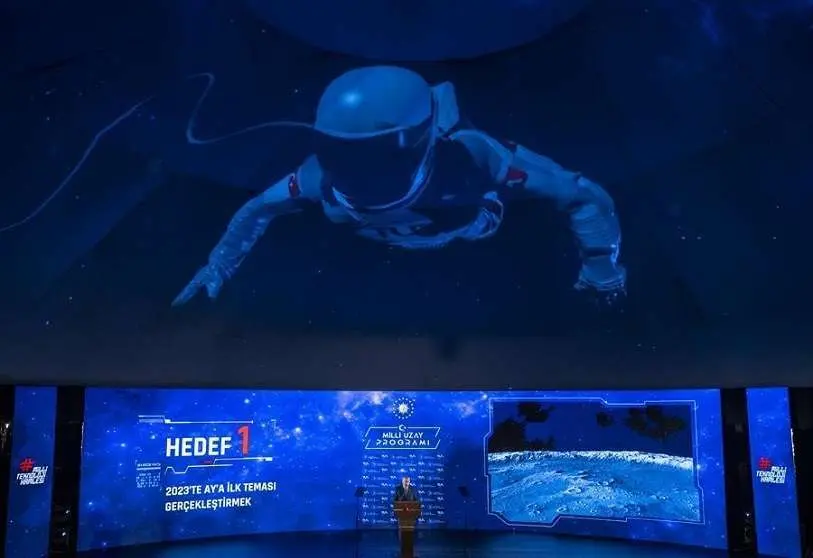Erdogan strengthens his space industry to take Turks to the Moon

The success of the United Arab Emirates in its risky bid to reach the Red Planet has aroused the interest of many political leaders around the world, who have so far not paid due attention to the space domain.
The first reaction in the Middle East region has come from Turkey, the Emirates' declared rival. It came from President Recep Tayyip Erdogan himself, who has just presented with the highest honours the first National Space Programme, a document detailing the Eurasian country's strategies, objectives and projects until 2030.
Erdogan chose 9 February, the date of the arrival of the Al-Amal spacecraft in Mars orbit, to unveil before a select audience of high-ranking government officials and Turkish business leaders the outlines of a roadmap that aims to "take our country to the top league of the global space race".

Despite the nation's fragile economic situation, but aware that space has become a priority on the global agenda, the politician who governs the destinies of today's Turkey announced with great fanfare that the "most important and main" of his ten strategic objectives is to "achieve the first contact with the Moon in the year of the centenary of our Republic", which is in three years' time.
Aware of the difficulties to be overcome in such a short period of time, in a first stage he envisages "an impact on the moon by the end of 2023" with a national launcher, which he described as a "hybrid" and which will become a reality thanks to "international cooperation", which he did not specify.

In a second phase, in 2028, he envisages a "soft landing" to carry out research on the surface of the Moon, which on this occasion he wants to achieve with a national rocket. Both goals call for the development of a family of space launchers to carry cargo to Earth orbit and beyond, plans on which its defence industry, specialising in missiles and rockets, is already working.
But the most ambitious of all the goals contained in the programme is to "send Turkish citizens into space to carry out a scientific mission". It has not given a timeframe, but it is clear that the project is long-term and seeks to attract and excite Ottoman citizens in order to catch up with the Emirates and get ahead of Egypt's plans.
The UAE has two astronauts, one of whom - Hazza al-Mansouri - flew into space in September 2019 and stayed on board the space station for eight days at the hand of the United States. In the case of the country of the Nile, President Al-Sisi has authorised the Egyptian Space Agency (EgSA) to enter into negotiations with Moscow and Washington to train a couple of its citizens to fly into space as soon as possible.

He also wants to deploy a regional positioning and synchronisation system, a technological challenge that involves high investments and no small number of hurdles to overcome. Recep Tayyip Erdogan wants his country to be independent of the United States' GPS, the European Union's Galileo, Russia's GLONASS and China's Beidou in order to have its own precise applications for territorial defence and security and international expansion.
But the Ottoman president's aspirations do not end there. His intention is to transfer the capabilities of his powerful defence industry to the space sector. One of the ways is to encourage national and third-country investment in what he has called a Space Technology Development Region, to be established in an unspecified location.
In order for Turkey to achieve greater penetration of the global space market, the Ankara government's efforts will focus on communications and Earth observation platforms, where its industry has acquired the greatest number of competencies.
Ultimately, the aim is to build a competitive satellite production industry "under a single authority" and the coordination of the Turkish Space Agency (TUA), to make the Eurasian country one of the top ten in the world with the capacity to develop, manufacture and test spacecraft on its own.

Created in December 2018 and attached to the Ministry of Industry and Technology headed by Mustafa Varank, the TUA is responsible for directing and executing the plans defined in the 2021-2030 space programme. The intention is to "open the door to heaven for Turkish civilisation", which, in Erdogan's words, "pioneered justice, morality and peace in the world for centuries".
A number of important satellites are currently being built in Turkey. One of them is the high-resolution electro-optical observation satellite IMECE, which is already in the testing phase and "will be launched into space in 2022", Erdogan confirmed, the same year in which the commercial communications satellite Türksat 6A, which is in the final stages of construction in the country, will be placed in orbit.

The very comprehensive Ottoman initiative does not overlook the importance of having a space surveillance network and a base on national territory to launch rockets and place their payloads into space without relying on the US, Russia, India or Europe. Plans include the creation of a sustainable commercial system that can meet national requirements and the demands of potential international customers. In short, an extremely ambitious National Space Programme, which Recep Tayyip Erdogan has not yet stated how much money he will provide to make it a reality.









